Installing the Horizontal Stabilizer.
We are making good progress toward installing thehorizontal Stab,
we just need to align the horizontal stab one last time and bond
it into place. This
will be accomplished by the folloing steps:
- Trial fit horizontal stab and level complete assembly
- Add fiberglass tape to horizontal stab
- Flox fuslease side of joing
- Assemble and let cure
- Dress resulting flange
- Bond horizontal stab
- Add reinforcing fiberglass
Step 1- Level the Fuselage – Level the fuselage as you did
before. Return the fuselage to its previous position and insure
it is perfectly level.
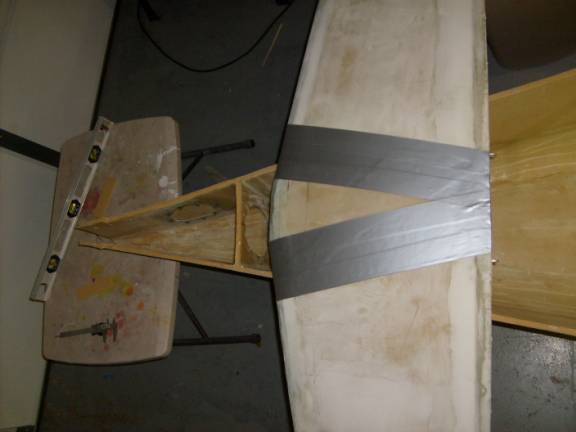
Release Tape on Horizontal Stab
Step 2: With the horizontal stabilizer on the fuselage, mark two
lines on the bottom about 2 inches away from the fuselage sides. Then
flip the horizontal stab over and apply a layer of duct tape so that
the horizontal tail surface is covered from at least 2 inches away
from the fuselage sides on both the inside and the outside. The
result should look like the above photo.
Step 3: Align horizontal stabilizer. This is the most critical step. You
will need to position the horizontal stab in its final resting place.
The cut out in the rear of the horizontal trailing edge where the
elevator bellcrank extends should be exatly centered between the
fuselage sides. The trailing edge should be aligned with the
notch in the fuselage side for it. The ribs inside the horizontal
stab can be seen through the skin and should be centered on the fuselage. Now
measure from the outboard spar to a point on the firewall and insure
that this distance is equal to both wing tips.
The cutout on the fuselage side will correctly establish the incidence
angle of the horizontal stab. This needs to be confirmed by
extending an imaginary line forward through the center chord line
of the horizontal stab and establish where it intersects the firewall. This
point should be about four inches from the top of the firewall.
Finally insure that the horizontal stab is level side to side.
It is important that once you establish the proper position of the
stab you can repeatably return the stab to this position and secure
it in this position. Once satisfied you can achieve this it
is time to fabricate the mounting flanges.
Step 4: Draw a line on the top of the stab down its absolute
center. Take your time in creating this line as it will be
used to reference the final location of the horizontal stab to as
well as establish the center line for the installation of the vertical
stab.
Step 5: Flip the horizontal stab upside down and apply a two layer
laminate using 3 inch wide BID centered on the fuselage sides and
the rear bulkhead. Your laminate should look like the following
photo.
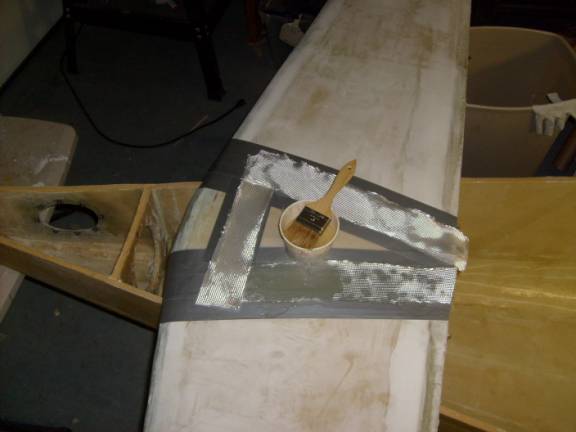 Apply Flange BID to Bottom of Horizontal Stab
Apply Flange BID to Bottom of Horizontal Stab
Step 6: Mix up a batch of thick epoxy and flox. Pack
this mixture into the slots along the top of the fuselage and rear
bulkhead created earlier by removing foam. This should be along
the entire area where the horizontal flange will attach to the sides
and rear bulkhead. The mixture should be piled into the slots
extending and eight to a quarter of an inch above the top edge.
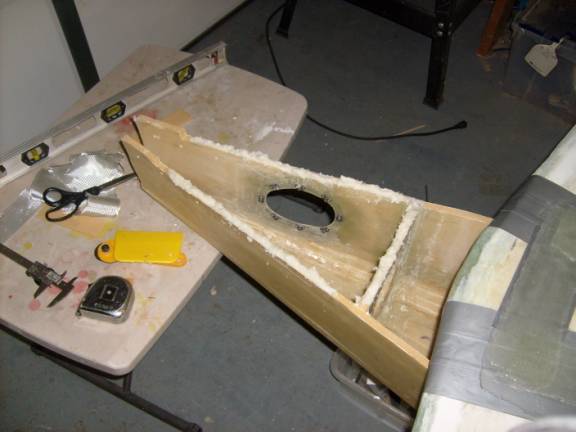
Flox packed into slots
Step 7: Re install the horizontal stab into its final
position and check, recheck and then triple check its proper position.
Use your finger to wipe away the excess flox that oozed from the
joint and create a nice radius. Once you are happy with its
location leave it be while it cures.
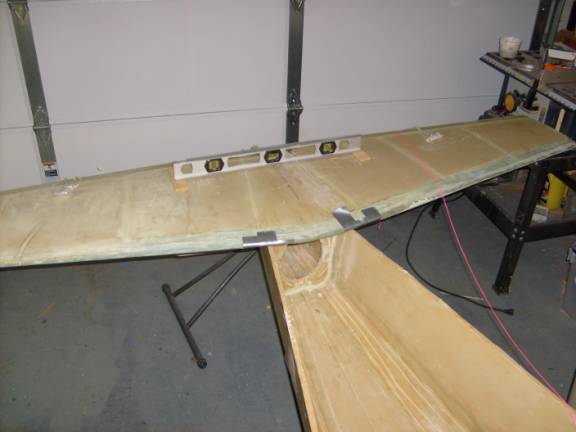
Horizontal Stab’s Final Resting Place
Step 8: Once the flanges have cured, wait at least 24 hours, drill
two holes on each side through the flanges and into the horizontal
stab to establish reference locators. These will be used later
to reposition the horizontal stab.
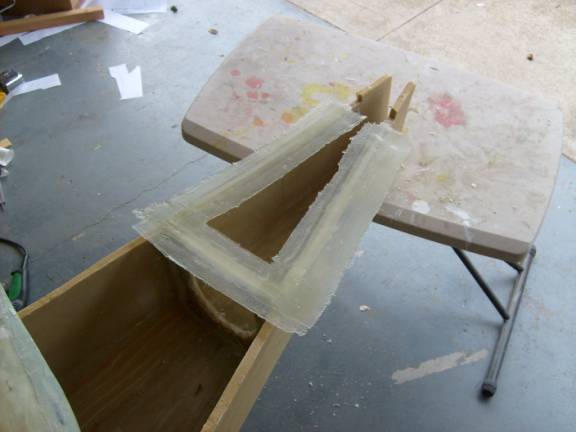
Resulting Flange
Step 9: Remove the horizontal stab from the flanges and trim the
flange to about 1.5” on each side. Use rough sandpaper
to smooth and radius the flox joint. Apply a two layer laminate on
the inside of the fuselage running along the bottom of the flange
down the side of the fuselage. Cover the entire flange and
have the layup run about 1.5” down the fuselage sides
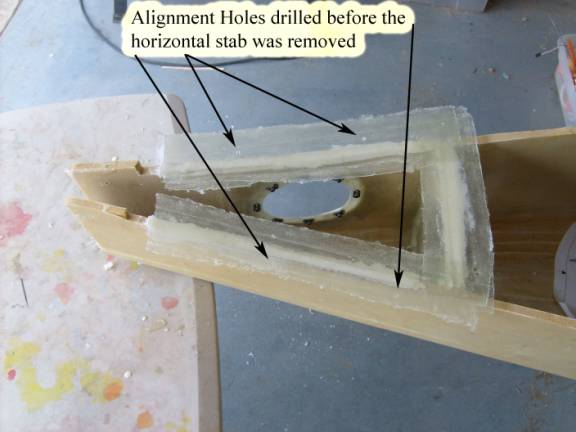
Alignment Holes
Step 10: When this inside layup cures, trim the flange and roughen
it with coarse sandpaper. Locate four screws, reposition the
horizontal stab and secure it with them through the holes you created
earlier. Assure yourself you can properly align the horizontal
stab and secure it repeatable. Once you have done this you
are ready to permanently attach the stab.
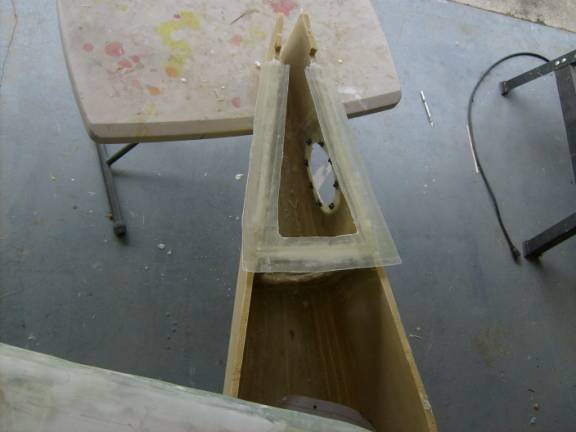
Final flange
Step 11: Give the flange surfaced and the bottom surface of the
horizontal stab a last foing over with rought sandpaper and a cleaning
with acetone. Position your mounting screws where you can each
them, have your levels and measuring tapes handy so you can confirm
the final mounting location of the stab.
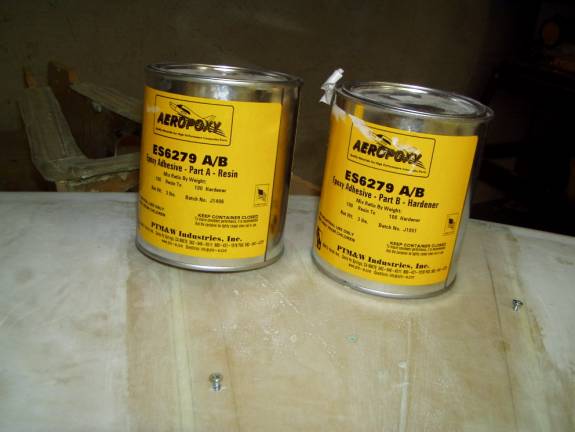 Structural Epoxy
Structural Epoxy
Step 12: Mix up a batch of structural epoxy, not the normal laminating
epoxy. Mix this very well then smear a thin layer on both the
horizontal stabilizer and the flange surface.
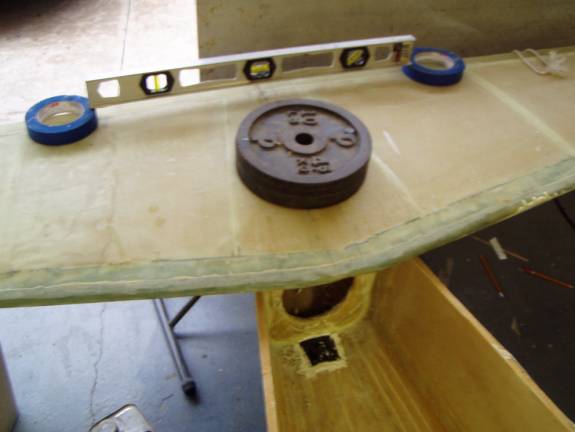
Final Bonding
Step13: Use the four screws to securely attach the stab to the flanges
and run through your last measurements to assure yourself all is
aligned properly for this last cure. The epoxy will ooze from the
joint, carefully wipe this away without disrupting the position of
the stab. Let the epoxy cure.
Step 14: Once the stab is bonded in place, flip the fuselage
over and grind down the heads of the mounting screws. Apply
a two layer laminate over the outside joint extending an inch beyond
the flange onto the horizontal stab and an inch and a half onto the
top of the fuselage side.
Step 15: Clean the inside of the rear section of the fuselage and
apply a four layer laminate, 2.5 inches wide along the bottom trailing
edge of the stabilizer onto the insides of the fuselage. Work
from the back of the fuselage and through the access panel in the
side to smooth this layup.
Congratulations! This is a major milestone. The fuselage
no longer looks like a boat, but like an airplane taking shape. We
are on a roll, lets bond on the vertical stab… |

 Apply Flange BID to Bottom of Horizontal Stab
Apply Flange BID to Bottom of Horizontal Stab




 Structural Epoxy
Structural Epoxy